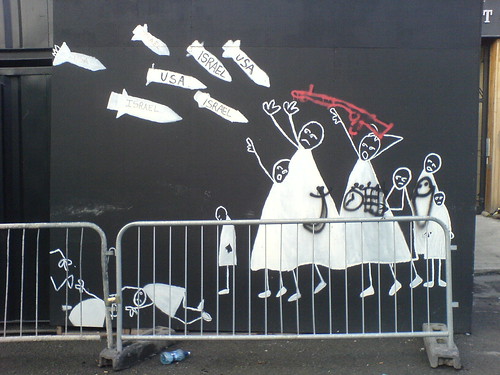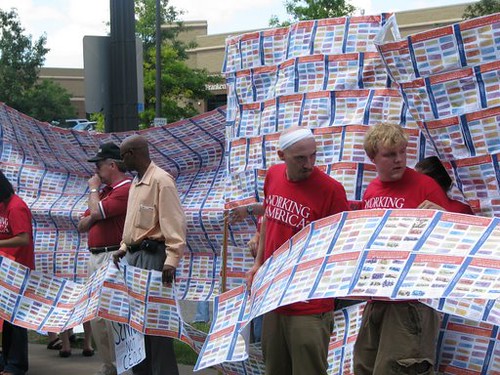And this brings us to the fresh starts and to forgiveness. And what that means... As a Christian, I look back to the example of Jesus.
Matthew 6:14-15 “If you forgive those who sin against you, your heavenly Father will forgive you. But if you refuse to forgive others, your Father will not forgive your sins."
That "But" is key.
 |
| image courtesy: Iran Press Watch |
When Jesus talks about forgiveness - and he does a lot - much like in the rest of the gospels, he's talking about what it means to live in the Kingdom, or kingdom-ly (or what we called a couple months ago, the un-Kingdom). Take that for what it's worth. It may or not be advice, but it points to an subversive understanding, a more better way, and an alternative to the corrupt powers of the other kingdoms (the world) - a completely different path than lay in the realm of the "powerful" of Rome, Egypt, Assyria, Babylon, the United States. What Jesus says should not be applied as law, but as the preferred method of those who follow him and his Way.
But notice this in your readings of forgiveness: in nearly every instance, Jesus speaks about both financial forgiveness and personal forgiveness simultaneously - as if he cannot separate the two. They are necessarily side by side.
In Luke 7, Jesus is at the home of some religious leaders and in barges the town prostitute. And the hosts are offended that Jesus would let her near without condemning her, let alone touch him. She's sobbing with regret. Most likely hurt. I doubt she wants to be sexually exploited and turned into a commodity day and night again. Its likely that it is due to the social structures and rules these very hosts employ and implement and justify that she finds herself in this predicament selling her body in the first place.
So Jesus finds it necessary to share a riddle:
Two men were in debt to a banker. One owed five hundred silver pieces, the other fifty. Neither of them could pay up, and so the banker canceled both debts. Which of the two would be more grateful?
- Luke 7 (the Message)Such stories in the Gospels are common - and disruptive. Disruptive to the norm, to the regulatory forces*, to the status quo and its comfort with itself and its self-righteous. There's the Lord's Prayer hinted at above, of course. There's the parable of the rich debtor, but there's also Jesus' very own inaugural sermon, when he declared the following to be about his ministry:
The Spirit of the Lord is upon me,- Luke 4 (NLT)
for he has anointed me to bring Good News to the poor.
He has sent me to proclaim that captives will be released,
that the blind will see,
that the oppressed will be set free,
and that the time of the Lord’s favor has come.
These lines themselves were adapted from latter Isaiah (Chapter 61 with some modification from chapter 58), which themselves were an expansion on the concept of Jubilee. Jubilee is a concept that the Mosaic Law introduced into Hebraic customs several hundred years prior. The idea is that every fifty years, families can reclaim their ancestral homes, debts are forgiven, prisoners are released. For a peasant class always under financial duress, the Year of Jubilee would be the Year of the Lord's Favor.
So forgiveness is necessary for financial justice.
But it's also necessary for spiritual justice.
Some Christian-led groups have been calling for Jubilee-like debt forgiveness for the poorest and most debt-ridden nations for years, most famously with the Jubilee 2000 campaign (and its offshoots) led to coincide with the Catholic Church's celebration of the Great Jubilee. This campaign had the intent of wiping out several billions of dollars of debt incurred to** Third World nations in Africa and Latin America. More recently and closer to home, an offshoot project of the Occupy movement (which has some tenuous connections with Christian and interfaith theology and practices) named the Rolling Jubilee is looking to subvert the bankers and collection agencies and those who profit from debt incursions by buying back debts and forgiving debtors (at pennies on the dollar). As of press, they have raised over $500,000 to absolve nearly 10.5 million dollars.
Say what you may about the situation - about how and why people and nations get into debt at astronomical rates - but to be released from that obligation and being able to focus on the day-to-day, on the familial and financial and community-based obligations that are also pressing and immediate, is an immense blessing, for lack of a better word.
But even still, taking care of the material, monetary debt is necessary, but we must not forget the spiritual, mental and emotional debt that needs forgiveness. After all, none can live on bread alone.
Now, when people in the Christian church talk about forgiveness, there seems to be a fundamental power imbalance. As my friend Sarah Moon so graciously points out, oftentimes victims of abuse in a church setting are commanded to forgive their abusers. Often, we are told that Jesus forgave the child molester. Ergo, everything is all good and that person should be allowed to work in the nursery (true story. Too often). Or spouses are commanded by the pastors to go back to their abusive partners (waaaay too often). Or the pastor, well, he's been pardoned by God for his "inappropriate" behavior. And so you are to pardon him too. Now!
But that's not forgiveness. That's forced, compelled, coerced, controlling, lying, false, insincere, dangerous, unhealthy, and ugly manipulation. Whatever it is, it is not forgiveness.
Forgiveness cannot work without boundaries. It cannot be forced. It needs to be nurtured and nourished. It needs to operate in safety. It cannot allow for injustice. Forgiveness does not allow for the pedophile to work with children - it recognizes that some behaviors will not change over night (if ever) and so makes a zone of safety for all those affected: children, spouses, parishioners, family, neighbors, constituents, you, me. That zone may require papers to be signed, people to be notified, offenders to be jailed. It will probably require time and distance.
But within that safe zone, miracles can happen. Miracles that both release the debtor and the indebted. Miracles that free the soul from the oppressive dictatorship of guilt and bitterness.
I find the act of forgiveness - of the spiritual and financial varieties - (though not necessarily forgetting or allowing back) to be fundamentally freeing. But if I'm honest, anything that is completely liberating is also as scary as hell.
When I recite the Lord's Prayer with my daughter and I get to the line about forgiving transgressions, I always pause. And I often bite hard.
And then I continue. A little bit lighter.
And in this practice, I tug away at the roots and branches and leaves of bitterness or frustration or angst laying deep beneath, or flourishing just above the surface, or suckling out the sunlight like anti-plants. They steal our joy. They steal our peace of mind. They take root and they rob us of sunshine and air and water and all the good elements - they lurk in the back of our minds and convince us that life is for the dead, these anti-plants.
The anti-plants need to eventually be uprooted. Only then can our gardens grow. Only then can we be set free from the prisons of our minds and hearts and from the prisons of indebtedness to others that we could never repay. This opens up boundless opportunities - not just for the self, but for those that we are near. And herein, a new cycle appears. For we are not just free as scattered individuals, but as members and parts of networks, families, communities. The effects of liberation on our communities are innumerable.
 |
| Nelson Mendela, after 27 years of imprisonment |
------------
*Jesus takes note that the Pharisees did not really welcome him, did not wash his feet - but this lowly prostitute just walking off the street cleans them with her tears and hairs
**Let us refuse to say "by" as if the countries asked for or deserved to be in debt for the crime of being plundered of economic, labor and natural resources












